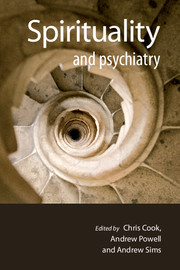Book contents
- Frontmatter
- Contents
- List of contributors
- List of tables, boxes and figures
- Foreword
- Preface
- The Spirituality and Psychiatry Special Interest Group of the Royal College of Psychiatrists
- 1 Spirituality in psychiatry
- 2 Assessing spiritual needs
- 3 Psychosis
- 4 Suicide
- 5 Child and adolescent psychiatry
- 6 Psychotherapy
- 7 Intellectual disability
- 8 Substance misuse
- 9 Neuroscience of the spirit
- 10 Spiritual care in the NHS
- 11 The transpersonal perspective
- 12 Religion and religious experiences
- 13 Pathological spirituality
- 14 Ageing
- Index
11 - The transpersonal perspective
Published online by Cambridge University Press: 02 January 2018
- Frontmatter
- Contents
- List of contributors
- List of tables, boxes and figures
- Foreword
- Preface
- The Spirituality and Psychiatry Special Interest Group of the Royal College of Psychiatrists
- 1 Spirituality in psychiatry
- 2 Assessing spiritual needs
- 3 Psychosis
- 4 Suicide
- 5 Child and adolescent psychiatry
- 6 Psychotherapy
- 7 Intellectual disability
- 8 Substance misuse
- 9 Neuroscience of the spirit
- 10 Spiritual care in the NHS
- 11 The transpersonal perspective
- 12 Religion and religious experiences
- 13 Pathological spirituality
- 14 Ageing
- Index
Summary
The transpersonal concept of consciousness may be unfamiliar to many psychiatrists and some of its tenets may not receive widespread acceptance, yet it could potentially be applied to psychiatric treatment. William James first coined the term ‘transpersonal’ over one hundred years ago. Meaning ‘beyond the personal’, the transpersonal perspective adds a deeper layer of appreciation to the individual and collective psyche. The term was reintroduced in the 1960s by Abraham Maslow and Stanislav Grof to describe an emerging model of mind that attempts to integrate science with the world's wisdom and spiritual traditions, as well as introducing a more complete model of consciousness than the one derived from traditional science, psychology and psychiatry (Vich, 1988).
Transpersonal experience is all human experience beyond the ego (Scotton, 1996a). If it occurs in a religious context, it will indeed be felt to be a religious epiphany. However, many spiritual and transpersonal experiences occur outside of religion and seem to represent a universal aspect of human consciousness.
The transpersonal field is multidisciplinary, incorporating insights from anthropology, theology, mythology, thanatology and parapsychology. It includes the empirical study of unusual mental states and psychological experiences which do not easily fit traditional psychiatric diagnostic categories.
Of the psychiatrists who have led the transpersonal field over the past hundred years, Carl Jung and Stanislav Grof have made especially important contributions. Both men drew deeply on their personal experience of nonordinary states of consciousness (NOSC), which informed and drove their clinical and theoretical work. Jung's transpersonal perspective and insistence on the importance of spirit was a major factor in his split with Sigmund Freud. Where Freud focused his attention on the personal unconscious and the ego, Jung emphasised the importance of the collective unconscious and the self. The tensions between these two schools of thought continue to this day.
The work of Carl Jung
The Swiss psychiatrist Carl Jung had a crisis in mid-life, with many unusual experiences that could be considered psychotic. This ‘creative illness’ lasted from 1912 to 1917, during which time he allowed himself to open to the contents of his deep psyche, becoming almost overwhelmed by the visions, dreams and intensity of feeling that followed. Jung felt his consciousness was flooded by forces which he called archetypal but which in previous ages may have been regarded as divine or demonic.
- Type
- Chapter
- Information
- Spirituality and Psychiatry , pp. 212 - 232Publisher: Royal College of PsychiatristsPrint publication year: 2009



